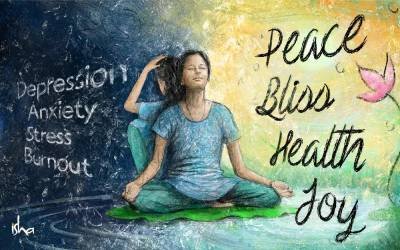Buddha’s Prescription for Stress
Layananda Alles, Montreal, Canada
Stress
The World Health Organization (WHO) and the International Labor Office state that in the developed countries 30-50% of the work force suffers from psychological stress and mental overload. Workforce is not the only place of stress. Living in the society is stressful with various demands being placed upon individuals. Reaction to stress varies from deterioration of the quality of work, inability to relax, irritability, aggressiveness, impulsive actions, and irrational behavior to daydreaming and depressed feelings. Often these symptoms are followed by physiological conditions such as high blood pressure, abdominal pains, headaches, insomnia etc. If unchecked, prolonged stress could also lead to alcohol and substance abuse, addiction to caffeine and smoking. Even too much positive or good stress could leave one totally drained in the long run.
Characteristics of Stress
We often blame external reasons, such as the work place, the roads, economic conditions, other people and even weather as the factors contributing to our stress. Closer and critical examination will show that these are mere agents, Stress is a phenomenon created in our own minds. These external agents of stress do not create stress; it is one’s attitude towards these agents that determine whether one is affected by stress or not. Since Stress is a phenomenon within our own minds, managing stress, or better still eliminating it altogether is also within our grasp. The question is how?
What is the genesis of stress?
There is positive or ‘good’ stress when one has the perception of control (of situations) and where there is self-satisfaction. In contrast, perceived lack of control, inability to satisfy desires, conflict, being out of harmony with reality gives rise to distress. Fundamentally, Stress results from inner conflict.
The underlying reason
These inner conflicts could stem from three main factors:
- Not living in the present
- Not accepting reality
- Need to satisfy desires
Not living in the present
Living in the past is stressful because of pleasant and bad memories. Pleasant memories are stressful because they are no longer present and bad memories are stressful because nothing can be done about them. Living in the past is escapism from reality; the only reality is the thin line of the present that represent the intersection of the past and the future time planes; both of which are unreal. Equally trying to live in the future is stressful due to the many unknowns. The fear of the unknowns results in stress. Many always assume the worse and are pre-occupied with “what-if” analysis. As such many of us very rarely live in the present.
Not accepting Reality
Not accepting reality means harboring unrealistic expectations. Not understanding what is controllable from what is not is often a reason for stress, for example weather. Also unfulfilled expectations, unsatisfied desires, plans not going according to one’s wishes as well as setting unrealistic goals and objectives are all good recipes for stress. In this regards aging, illness and death should be specially mentioned. Many live in denial of these fundamental realities of living, thus subjecting oneself to stress. These are eventualities neither controllable nor predictable.
Need to satisfy desires
The other key factor is the relentless desire to please the Self or the Ego, be it for social or competitive reasons. This overwhelming need to satisfy the ego results in running after pleasures both mental and physical. It also causes one to live beyond one’s means. Further these conflicts in the mind result from comparisons such as:
- What I have vs. what I like to have
- My view vs. the others
- What I believe vs. what the others believe
In a nutshell,
- Trying to live with conflicting demands is stressful
- Unrealistic goals or desires are stressful
- Competition is stressful
- Trying to be what you are not is stressful
- High strung living is stressful
How can we eliminate stress?
If the conflicts in the mind stem from (a) Not living in the present, (b) Not accepting reality, and (c) Need to satisfy desires, then by treating each of these areas it should be possible to eliminate conflict thus eliminating stress. It is here that Buddha has given us many prescriptions. Let us examine some of those prescriptions.
Mindfulness
Buddha prescribed living with awareness and mindfulness at all times. Following this prescription allows us to accomplish all tasks effectively, without any reference to their relative importance. Awareness also allows us to monitor verbal, physical and mental actions, thus ensuring that these actions are always in accordance with the core principles of the Buddha’s teachings. Not only do we eliminate stress but we also ensure we do not cause stress to anyone else either. Although we ensure that the verbal, physical and the mental actions are the right action, it should be borne in mind that it is not always possible to control the outcomes of these actions.
Grounding in Reality
Buddha said that everyone is subject to the eight worldly Dhammas. He described impermanence as the true nature as well as he described the nature of self or the lack thereof. He showed aging, illness and death as inevitable eventualities. Acknowledging these realities and living accordingly is the first step towards achieving peace of mind. This does not mean that one stops planning for the future; rather it means these plans must be based on realistic expectations and objectives. Also one must make allowances for plans to change. In planning and executing plans, one must recognize those situations and actions that are within one’s control from those that are not. On this note one must certainly control one’s faculties. Nothing can be done about the past Very little control over the future. By fully accepting the present reality one can influence the future on that basis. All expectations must be grounded in reality. Since stress results from the choices we make, we should be making prudent choices with awareness.
Need to satisfy desires and expectations
Virtually all our time is spent satisfying our basic needs as well as desires and expectations. Just satisfying basic needs could be difficult. This overwhelming need to satisfy the ego and the self result in running after pleasures both mental and physical. Competition, the need for recognition, satisfying the ego, etc. increase the complexity of these desires as well as the difficulty in meeting these desires giving rise to stress. As The Buddha prescribed, simplicity, lowered expectations, low maintenance are key steps towards eliminating stress. Stress also results from having to meet social expectations as well as those of the others. One must be independent; being pleasant but not always pleasing others; being dependable but not be driven by the expectations of the others. These
Tenets help eliminate stress.
Methodology
Buddha’s prescription for stress is mindfulness and awareness. Through mindfulness and awareness one’s actions will always be based on the core principles. It is the proper cultivation of the mind that will ultimately eliminate stress to give peace of mind. Accepting reality about aging, illness and death

